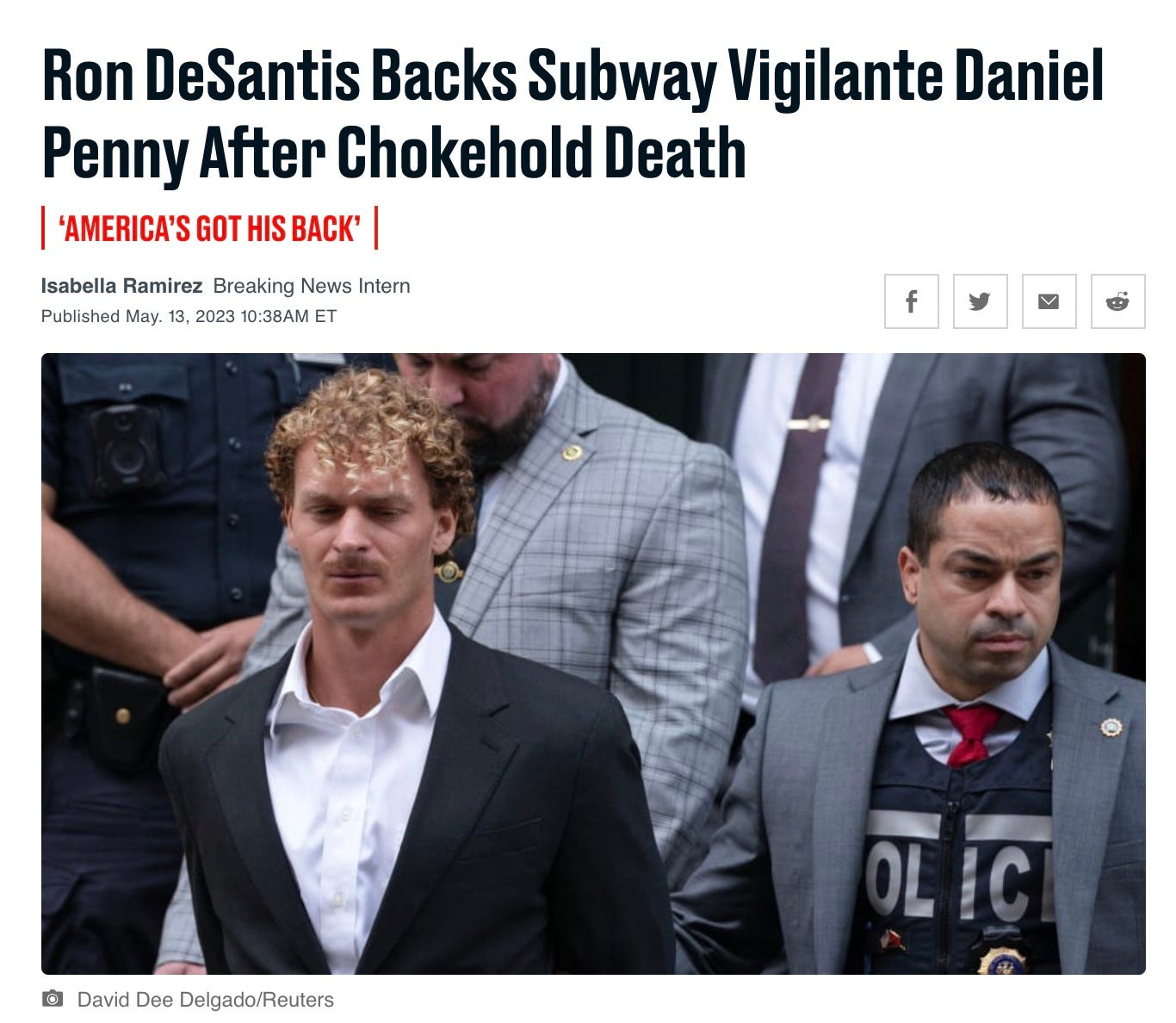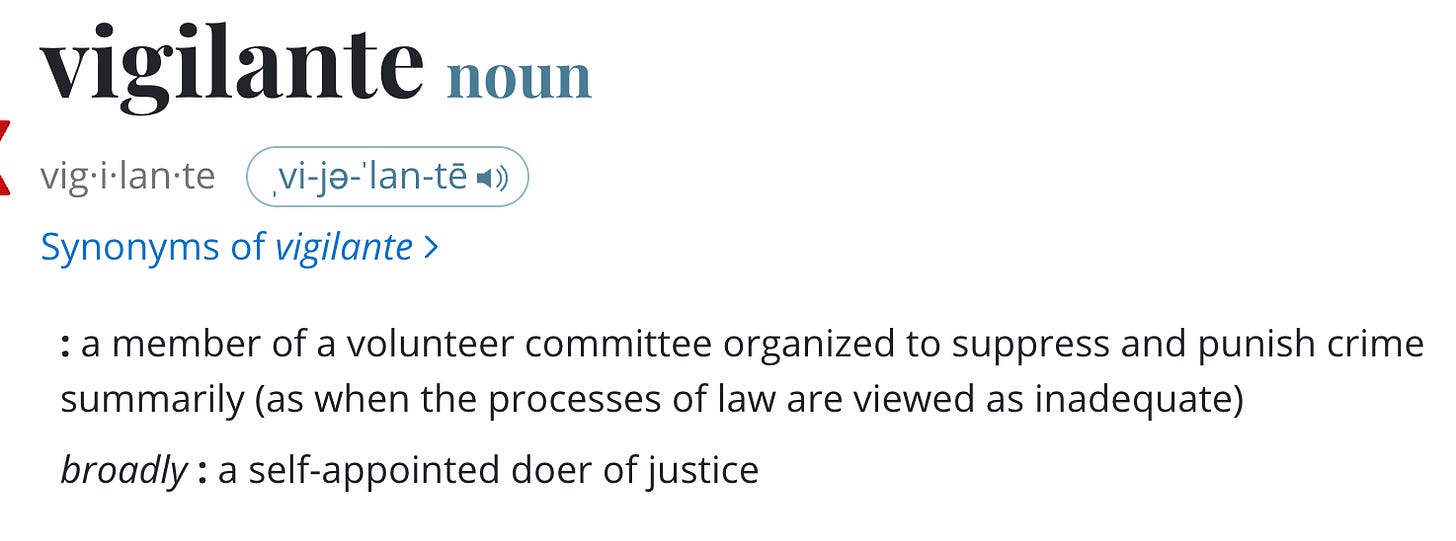The Daily Beast, sounding a theme you can find all over the place:
Daniel Penny, the framing goes, was a vigilante: he stepped in on his own to restore order and control an apparent threat, instead of just waiting for the police. But that’s not what the word means, and it’s not how vigilantism works, and the casual and ubiquitous redefinition says a bunch of interesting things about the way we live now.
Surprisingly, Merriam-Webster still offers a decent definition of vigilante, rooted in historical meaning:
A vigilante isn’t getting a handle on things until the police can get there; a vigilante intends, with forethought and planning, to be judge, jury, and executioner. In 19th-century San Francisco, the Committee of Vigilance had signals to summon members, who caught criminals, held extrajudicial “trials,” and carried out sentences. Vigilantes grab the thief and throw a rope over a tree branch. No one has suggested that Daniel Penny shouted, “No, don’t call the police — I’ll kill this one myself.” No one has suggested that Penny rode the subway with the conscious, preconceived intention of grabbing people he viewed as criminals and deliberately carrying out his own sentence of death. Even the charge filed against him — involuntary manslaughter, killing someone accidentally by being reckless — pushes back against the framing of vigilantism. If you see a robbery, for example, then call the police and grab the robber to hold him until they get there, you are not a vigilante, or anything close to it.
So the reframing is remarkable, and it’s important to notice what it’s meant to do: any act of personal initiative against a crime, a threat, or a serious act of social disorder is vigilantism. The implication is that passivity is your duty, you should always allow professionals to handle a problem entirely, and your personal involvement in the absence of a government title is pathological. If you point the garden hose at your neighbor’s burning house while you wait for the fire department to get there, you’re a vicious usurper — that’s not your official role, you fire vigilante.
At the root of all this framing is the reality of police authority. The word “police” predates police departments by at least many centuries. Historically the police function is the function of maintaining the peace and order of a community, and it belongs to the community. (You police the polis.) Before the professionalization of the police function — an act of contracting out, an assignment of a community function to hired specialists — your neighbors helped you “police” your community. Neighborhoods caught a thief or a violent person, and brought him before the local justice of the peace, or some similar magistrate. Sheriffs only helped: took the accused into custody, or went out and found the accused, on the basis of the neighborhood action and the magistrate’s reaction. The first American “police departments,” with hired police officers, were started in Boston and New York in the 1840s. There was a police function before those departments existed. It belongs to you; your community hires professionals to carry out the community function of maintaining peace and order, but that function doesn’t belong to government agencies.
Policing, then, originating in community authority, is the restoration of order by local action in partnership with legal institutions; vigilantism requires the intention to engage in extralegal activity, wholly outside formal channels. “We ain’t takin’ this SOB to no damn judge,” a vigilante says, looking around to see who has a rope. The absurd recoding of all acts of personal initiative into “vigilantism” is a story about the rise of what Christopher Lasch called the “helping professions” and the increasing expectation that society will be ordered by technocratic specialists. You can’t help other people — you don’t even work for the government!
Remember the debate in the California legislature about AB 665, the bill that will allow counselors to take children out of homes without parental consent — even in the absence of abuse or neglect — to receive residential mental health services. Asm. Bianca Rubio explained on the floor of the Assembly that government has to require mental health services for children outside of the family, because parents can’t possibly do anything to ensure it — since they aren’t credentialed as mental health providers. You can’t make your child healthy, you idiot! You don’t even have a license in that!
So: Daniel Penny helped other people in the face of an apparent threat, despite the fact that he had no credentials to do that; therefore, he’s a vigilante, a pathological figure. He should have sat there quietly and waited for the proper professionals to arrive. This framing describes an entire vision of a properly functioning society, and it’s far more sick than it appears at first glance.





And by the way:
https://www.givesendgo.com/daniel_penny
I gave. By the time I got there, it had cracked the million-dollar mark, so I only gave twenty bucks. But a good symbolic action in any event.
I know the NYC subways well. No one wants to be stuck in a subway car with someone making violent threats and otherwise acting erratically. No one should have to accept that circumstance. Unfortunately, police can’t be everywhere and most people, unlike Daniel Penny, are not willing to get involved. However, I can assure you, that Penny’s fellow passengers were relieved and grateful that he stepped up - not as a vigilante, but as a fellow passenger who has the ability and courage to offer assistance. It is tragic that Jordan Nealy died, but it’s not Daniel Penny’s fault that Nealy was allowed to be on the streets or that he died being subdued. I have no doubt that Penny expected to hold him and turn him over to the police and had no desire to hurt him.